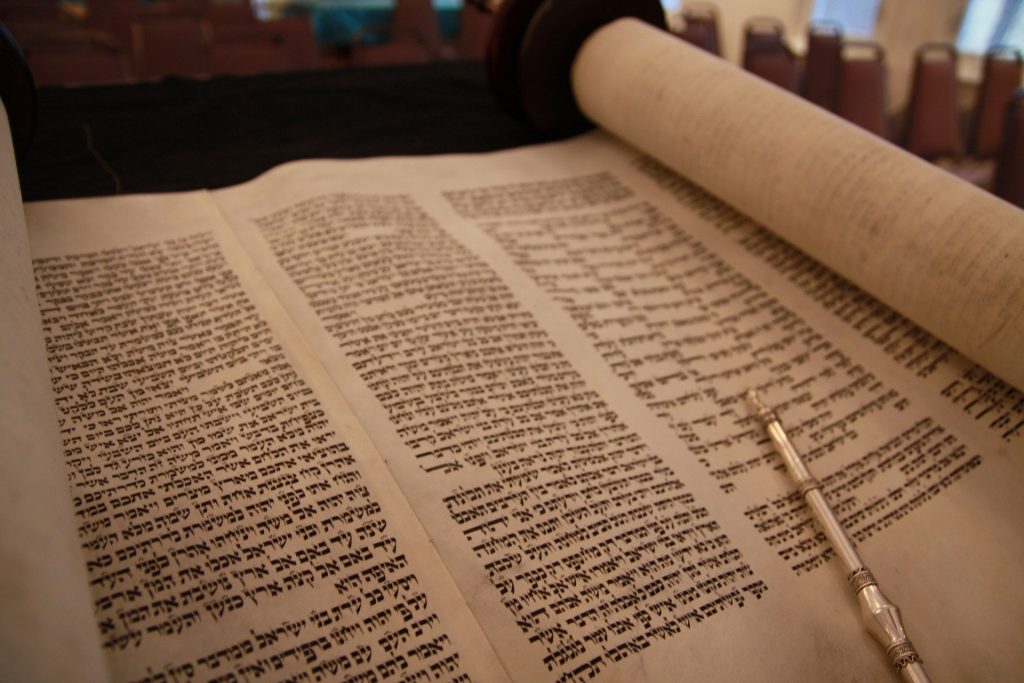
(4-5 Minute Read)
Genesis 1:1 – 6:8
The Torah begins with the Hebrew phrase Bereishit — “In the beginning” the Almighty created the heavens and the earth. The first chapter of the Torah elaborates on this creation process, describing the emanation of light, water, land and vegetation, the universal bodies, fish and birds, land animals, and finally the first man and woman. After the Most High had finished His act of creation, He “rested” on Shabbat, the seventh day of Sabbath.
After being commanded to “be fruitful and multiply,” man and woman were placed in the Garden of Eden with the strict instruction not to eat from the Tree of Knowledge of Good and Evil. Eve, after being derived from the “rib” or “side” of Adam, approached the tree of forbidden fruit. After a deceptive conversation with the serpent, Eve disobeyed the Eternal One and ate the fruit; Adam likewise joined her in the misdeed. As a result, the Creator announced the consequences of their disobedience and banished them from the Garden of Eden permanently.
Adam and Eve had two sons named Cain and Abel. Abel brought a proper offering before the Most High from his flocks; Cain brought an improper offering of the “fruit of the soil.” The Almighty accepted Abel’s offering but rejected Cain’s. Enraged with jealousy, Cain murdered his brother and was exiled by the Eternal One. There, Cain developed his own family and civilization.
Adam and Eve had another son, Seth, and other sons and daughters. Ten generations existed between Adam and Noah, with humanity living much longer lifespans than in modern times. As the centuries rolled on, humanity progressively descended into deeper levels of debauchery and evil, to the point that the Most High was grieved that He had ever created mankind. But Noah was a righteous man and found favor with the Almighty.
Bereishit describes the beginning of the universe and more specifically the beginning of mankind. Although the Torah and the instructions thereof were officially given to Moses and the Jewish people at Mount Sinai well over two thousand years after the creation of man, the format and key themes of the entire Torah can be found even in the first few chapters of Bereishit, or Genesis.

It is a common misconception that the first commandment in the Torah relates to a prohibition against the eating of the fruit of the Etz HaDaat, the Tree of the Knowledge of Good and Evil. In reality, the first instruction was to “be fruitful and multiply” and to have dominion over the earth. Similarly, every seed-bearing tree and fruit would serve as a source of food for mankind as well as animals. Following these dictums, the Almighty declared that every tree in the Garden of Eden was acceptable for food except the Tree of the Knowledge of Good and Evil.
In a sense, much of the blueprint of the entire Torah is outlined in just these first commandments. The purpose of all humanity is to create successful families and live in a proper and healthy manner on the earth. And the premise is immediately created that healthy and successful families (and life in general) are defined by an obedience to the commandments of the Most High. In other words, even the first commandments are guidelines paralleling successful living and properly functioning societies.
Taking it a step further, the next commandment involves the Eternal One declaring that Adam and Eve were not to eat of the forbidden fruit.
“Of every tree of the garden you are free to eat; but as for the Tree of the Knowledge of Good and Evil, you must not eat of it; for the day that you eat of it, you shall die.” Bereshit (Genesis) 2:15-16

First, we see a principle expressed that is crucial to understanding Torah and Halacha (guidelines for Jewish life derived directly from the Torah or from related rabbinical injunction). That principle can be defined as “whatever is not prohibited is permitted.” Some commandments in the Torah are directives calling for specific action, sometimes referred to as “Thou shalt’s.” Others are passive and prohibitive, similarly noted as “Thou shalt not’s.” In Bereishit, we see the instruction of “Thou shalt” be fruitful and multiply, and have dominion over the earth. Following that, we see the commandment of “Thou shalt not,” in that all trees of the Garden of Eden are permitted except the Etz HaDaat, the Tree of the Knowledge of Good and Evil. Secondly and more importantly, the Almighty makes it very clear that disobedience to His commandments results in — and is essentially synonymous with — death.
In the minds of some, the fruit of the Tree of the Knowledge of Good and Evil is seen as being some kind of “spiritual poison,” almost like a “magical bad mojo.” And this “poison” is what enabled mankind to understand the difference between good and evil. In reality, it is potentially much simpler than that. The fruit of this tree forbidden by the Almighty bestowed the knowledge of good and evil simply by giving Adam and Eve the ability to choose between the two. Good is defined as obeying the Creator; evil is disobeying Him. In a sense the serpent was actually correct in Bereishit (Genesis) 3:5 when he essentially stated, “when you eat of the fruit your eyes will be opened and you will understand the difference between good and evil.” That was true; by committing evil humanity could understand what it was. What the serpent did not tell Eve, however, was that by not eating the fruit she (and Adam) would gain the same knowledge. In other words, everything in the Garden of Eden was tov, good and permitted. As such, without the prohibition of the forbidden tree there was no possible way for mankind to even comprehend the concept of obeying the Most High out of a conscious choice of free will because we love and revere Him. But if Adam and Eve had chosen instead to avoid the fruit entirely and only engage in the tov, the good, by default the first humans would have understood what evil was — not by experiencing it through disobedience, but by rejecting it through obedience.
Perhaps more than any other aspect, these ideas are the most central concepts of the entire Torah. Indeed, they define the purpose of all of mankind, especially the Jewish people. From the very moment the Almighty finished His works of creation, He effectively instructed us to establish families and societies based on healthy living; we are to obey the commandments of the Most High out of a sense of love and reverence for Him; and we must actively choose of our own free will to live our lives according to these concepts and guidelines each and every day of our lives.

Not surprisingly, the final chapters of the Torah reiterate the same idea. In Devarim (Deuteronomy) 30:15 , Moses began “wrapping up” the Torah narrative. At the direction of the Most High, Moses made the following statement, echoing the words and sentiment of the Creator in the Garden of Eden:
“See, I set before you this day life and prosperity, death and adversity. For I command you this day, to love the L-RD your G-d, to walk in His ways, and to keep His commandments, His laws, and His rules, that you may thrive and increase, and that the L-RD your G-d may bless you in the land that you are about to enter and possess. But if your heart turns away and you give no heed,… I declare to you this day that you shall certainly perish… I have put before you life and death, blessing and curse. Choose life — if you and your offspring would live — by loving the L-RD your G-d, heeding His commands, and holding fast to Him. For thereby you shall have life and shall long endure upon the soil that the L-RD swore to your ancestors, Abraham, Isaac, and Jacob, to give to them.”
Just like the Creator first declared in the Garden of Eden, obedience would result in life and successful, healthy living; disobedience to His commandments would bring certain death. After further defining the instructions from the Almighty to the Jewish people (which generally also relate to successful families, vibrant communities, healthy living, and a proper connection to the Eternal One), the Torah concludes with a reiteration of the same idea: obey the Most High’s commands and choose life, rejecting disobedience and death.
May the Holy One, Blessed be He, provide us with the wisdom and strength to always “choose life” by following His commandments in the Torah. And may we ever be blessed with successful families and communities as well as healthy living, especially as we strive to diligently adhere to His instructions.


